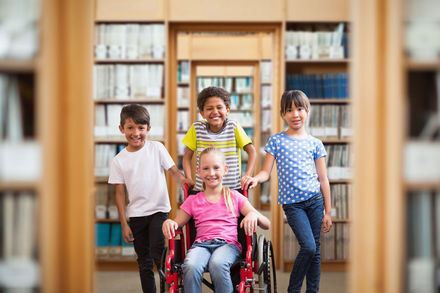 In our neck of the woods, the 2018-19 school year is about to be at full throttle. Parents have sharpened the No. 2 pencils, stocked backpacks, purchased polo shirts and planned lunches. But, are these children ready to reconnect with their schoolmates with disabilities in ways that makes them feel comfortable with their questions and compassionate in their actions? Easterseals of Northeast Central Florida encourages parents to discuss with their children how to think about and connect with people with disabilities. What can parents teach their children about disabilities? What should they say? Here are four suggestions on what to keep in mind when you talk to your child about their peers (and others) with disabilities: 1. Words are important. Teach your child the appropriate words to use when talking about the differences they may see in others, such as “disability,” “special needs,” or even the name of a specific disability like Down Syndrome or Autism. Teach your child that name calling is not acceptable, and neither are jokes at a person’s expense. Always encourage your child to use respectful language - or “people first” language - when talking about a person with disabilities. Ex, a friend with autism versus an autistic friend; a child who uses a wheelchair versus a wheelchair bound child. 2. A person with a disability is not necessarily sick. Educate you child that they cannot “catch” a disability from someone else. Though an illness can cause a disability, reassure your child that the disability is not a sickness. 3. Your child has things in common with others who have disabilities. Everyone has differences, it’s just that some differences are more noticeable. Instead, focus on what your child and others have in common: eyes, hands, smiles, feelings, etc. And, though someone may have a physical disability does not mean they have a cognitive one. Adults and kids with disabilities can do many things people without those challenges can do, it just may take them a little bit longer or they may accomplish the task in a different way. 4. Questions are allowed and welcomed! Children are naturally curious, and it’s one of the things we love about kids! Encourage your child to ask you questions, and if you don’t know the answer, Easterseals is always here to help. (Call us at 386-255-4568.) Or, pass your child’s question along to a teacher or the child’s parent. Most parents would invite an opportunity to bridge the gap between their child and yours. Your child is looking to you to guide them on how to interact with others, including those with disabilities. Be a strong example by showing respect and kindness. When you do, you join Easterseals in changing the way the world defines and views disability – whether physical, intellectual, emotional or social – by making profound, positive differences in people's lives everyday. Sources: Easterseals, today.com, scarymommy.com, care.com
2 Comments
8/12/2019 11:57:59 pm
Disabled people are not to be pitied. If you ask me, being pitied at is worse than having a disability. If you are someone who pities our people, then you, my friend, are a horrible person. No matter how sad others may seem, you should never go and feel sorry for them. You need to think about what they would feel when you do that. Nobody wants to be pitied at, it is the worst feeling in the entire world.
Reply
1/24/2024 09:49:55 pm
Thank you for sharing the information about CVS Health Pharmacy and their customer feedback survey. It's great to see that they are actively seeking input to improve their services. Participating in the survey at https://www.cvshealthsurvey.me/ seems like a valuable opportunity, with the chance to win a $1000 cash prize. I appreciate you bringing this to my attention.
Reply
Leave a Reply. |
Details
Archives
May 2024
Categories
All
|

 RSS Feed
RSS Feed